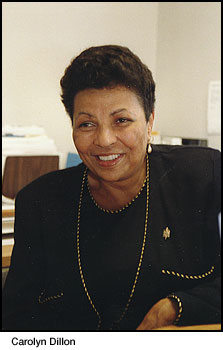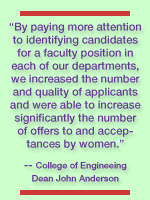|
|
|||||
|
|
Job Recruiter Carolyn Dillon Aims to Spark Increase in Diversity Among University Staff
Dillon said while working at the University of Pittsburgh in the late 1990s, that she once roamed the computing book section at Borders in search of candidates to fill a high-level computing position. She said as people came by to look at the computing books, she casually started a conversation with them and told them about her search. She asked them if they, or anyone they knew, would be interested in the position. She gave them her card. "I'm always on the job," Dillon said. "If I see someone reading the want ads on the bus, I give them my card. I introduce myself." Dillon's ambition, know-how, and at times "unorthodox " methods as a job recruiter earned her a return engagement at the university this past July as Carnegie Mellon's new coordinator for staff diversity. Increasing diversity across campus among trustees, senior administrators, faculty, staff and students is a strategic goal of the university. The coordinator of staff diversity position was established in response to a recommendation by the university's Diversity Advisory Council, a group of trustees, faculty, staff, students and Pittsburgh civic leaders whose aim is to build awareness of diversity issues on campus, spearhead new initiatives and monitor progress. The DAC, chaired by President Jared Cohon, includes five workgroups focusing on diversity issues relating to faculty, staff, undergraduate students, graduate students and the overall climate and culture at Carnegie Mellon. A full-time senior administrator to help foster the development of diverse applicant pools for job openings and to oversee staff diversity issues was the recommendation of the staff taskforce. Dillon said her Rolodex was one of the reasons she got the job. "Everett (Tademy, Director of Diversity and Equal Opportunity Services) said he was looking for someone with his or her own Rolodex, someone who could hit the ground running," she said. "I told him that not only do I have a Rolodex, but I've been in touch with everyone in it during the past six months. I call everybody. I'm the type of person who always stays in touch with folks. "People that I had known at Carnegie Mellon and the University of Pittsburgh years ago, I've stayed in touch with."
"I'll call to see if they've heard of any new companies coming to town, if they know of any future layoffs, or if they know of anyone looking for a new position," she said. "If you're a recruiter at heart, you really always want to see that a person has a job, whether it be with your group or somewhere else." Dillon will work with Carnegie Mellon Human Resource representatives Patricia Gyurke, Ed Hey and Freida Williams, outside consultants and search firms to help create qualified diverse applicant pools for staff positions. She said when job openings arise she'll meet with department administrative coordinators and managers to learn more about the position, to discuss the type of individual and work skills they're seeking and to help them with the hiring process. She'll then turn to her rolodex and contact groups and organizations like the Hill House Association, Hosanna House, the Bidwell Training Center, the Urban League of Pittsburgh, the Society of Black Engineers and the African American Chamber of Commerce. She said she'll also seek candidates at minority job fairs and by contacting university groups, like Staff Council, the Black Alumni Association, CMAP and the Black Faculty and Staff Association. "I'll contact them to see if we can post the job with them, and to see if they know of anyone who may be interested and fit the bill. You have to be proactive. But candidates must be qualified. I will never, never send someone to a job interview that's not qualified," she said. Tademy said Dillon has referred a number of candidates for a variety of campus jobs since starting this past summer. "Her ability to make contacts with the community and groups external to Carnegie Mellon has been key in this regard," he said. "She's making contact with other colleges and universities, like Pitt, Chatham, Carlow and CCAC, and she's contacting corporate neighbors like the Port Authority, Nova Chemicals, Highmark Blue Cross Blue Shield and UPMC." Dillon said she has built strong relationships and networks and established credibility with many community groups and associations. "People know me. They know when I say, 'I'll follow up,' that I will. You have to be proactive. The trick is getting notification of the job to the right people." Another "trick of the trade" is knowing "how" to recruit certain people. "Often African Americans who have achieved a certain amount of success are what we call 'passive candidates,'" Dillon said. "They don't tell anyone that they're looking. So you have to know where they hang out, what Web sites they're going to and to whom they're talking. I know that by talking to certain people, you'll indirectly get the message to them. I've established a good working relationship with the African American Chamber of Commerce." While Dillon's charge is to focus on increasing diversity among the higher level positions at the university-grades 8 and above-she said she's "not shutting out anyone." "The way I see recruiting is that if you run into someone who's at a grade 6 and they look like an excellent candidate for a position, I'm going to recruit that person too."
Dillon earned her bachelor's degree at Governors State University in Illinois and did her clinical work for her master's degree in speech pathology and audiology at the University of Pittsburgh. She is also a graduate of the College Management Program at the Heinz School.
Related Links:
Bruce Gerson
|
|||
|
Carnegie Mellon Home |
|||||
 Carolyn Dillon says one of the keys to being a good job recruiter is knowing where to find qualified candidates. After 18 years experience in human resources, Dillon knows of many places to look, including a few unusual spots, like Borders Bookstore.
Carolyn Dillon says one of the keys to being a good job recruiter is knowing where to find qualified candidates. After 18 years experience in human resources, Dillon knows of many places to look, including a few unusual spots, like Borders Bookstore.
 Dillon first joined the Carnegie Mellon staff in 1981 as an administrative assistant for then Vice Provost Doug Van Houweling, before becoming an assistant financial aid director in 1982. Two years later she became a recruiting coordinator at Equibank. She joined the University of Pittsburgh as a job recruiter in 1995, before becoming manger of human resources for the Carnegie Mellon spin-off Carnegie Technology Education in 2001. She said she often calls her former employers and colleagues, as well as prospective employers, to find out the latest news in the job market.
Dillon first joined the Carnegie Mellon staff in 1981 as an administrative assistant for then Vice Provost Doug Van Houweling, before becoming an assistant financial aid director in 1982. Two years later she became a recruiting coordinator at Equibank. She joined the University of Pittsburgh as a job recruiter in 1995, before becoming manger of human resources for the Carnegie Mellon spin-off Carnegie Technology Education in 2001. She said she often calls her former employers and colleagues, as well as prospective employers, to find out the latest news in the job market.
 "Departments must accept, take on and embrace diversity issues," said President Jared Cohon at an early-November town hall meeting.
"Departments must accept, take on and embrace diversity issues," said President Jared Cohon at an early-November town hall meeting.